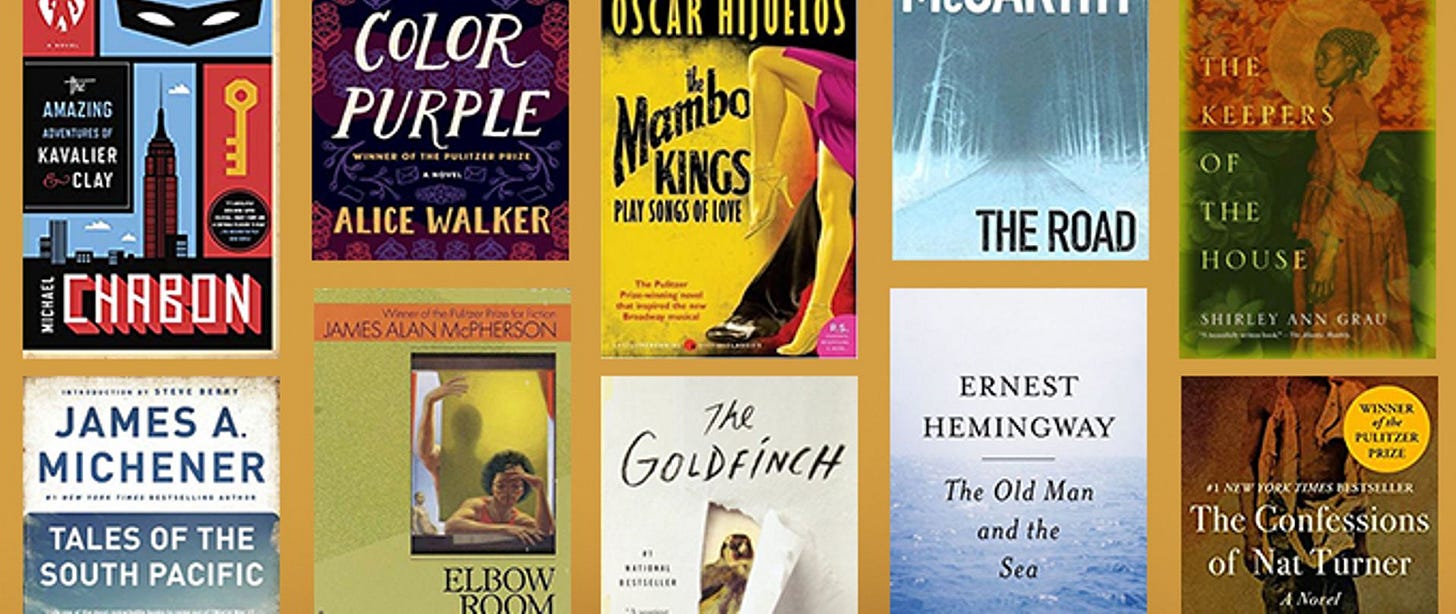Introducing the Pulitzer Project: A Quest to Read All Prize-Winning Books (Including Non-Fiction)
Between 2017 and 2021, I read a biography of every American president. It was a project that spanned 60+ door-stopping books (I read multiple volumes for a number of presidents), totaling tens of thousands of pages and hours upon hours upon hours of reading.
Since then, my reading has been quite meandering. I’ve wandered through library shelves, used bookstore shelves, my own shelves. I’ve thought about diving deeply into genres like sci-fi/fantasy or historical fiction, but I know I’d eventually get bored. I’m a reader who really enjoys variety in genres and subjects.
For a long time, I’ve had a prize list at the top of my mind. Book awards lists aren’t perfect, but they’re always interesting. Every winning title has been chosen for a reason and has something unique to say about society at that moment.
The Pulitzer Prize quickly emerged as the gnarliest, most ambitious option. Across fiction and non-fiction, the Pulitzer has been the most esteemed and well-known prize in publishing for over a century.
Since 1917, Pulitzers have been awarded “for achievements in newspaper, magazine, online journalism, literature, and musical composition within the United States.” There are five sub-categories of books that I’m interested in:
Fiction
History
Biography
General non-fiction
Memoir or Autobiography — created just this year (previously, this genre had been part of the biography category)
(There are awards for poetry and drama, but I’ve never been one to read in those genres. Perhaps someday.)
I was understandably reluctant to accept this self-imposed challenge. Plenty of folks have embarked on a quest to read all of the winning novels — a list of 97 titles — but as far as I can tell online, nobody in the internet era has attempted to read all of the fiction and non-fiction titles (and document it).
I couldn’t resist.
As I tend to do, I made a spreadsheet. After a bit of tallying, I counted up 377 titles to read, and even that number ends up being a little short because a number of prizes have been awarded to a series. I’ve read 29 of those titles already, less than 10% of the goal. I’ll likely re-read some of those, but not all.
There are well-known classics (To Kill A Mockingbird) and totally unknown histories (1947’s Across the Wide Missouri). Regardless of what I think of each book or story, I know I’ll learn something worthwhile about America, about humanity, and hopefully about myself.
I don’t have a timeframe in mind — more than a handful of years, most likely — nor do I intend on going in any kind of order. Knowing myself, the only way to actually accomplish this goal is to allow my whims to take me between decades and genres at random. It definitely won’t be all of my reading, either; as when I was reading POTUS biographies, I need room in my life for murder mysteries, book club reads, and new books that catch my eye.
Wish me luck and keep an eye on my updates in the newsletter. In the coming weeks and months, I’ll provide some background on the prize, interesting stories (like years where no prize was awarded), why there are four non-fiction categories, the biggest snubs, and more.
Currently, I’m about one-third through Robert Caro’s The Power Broker (1975, biography) and I’m listening to Eliza Griswold’s Amity and Prosperity (2019, general non-fiction). I don’t know what’s on deck after that, but I know I’ll find something interesting.
As always, thanks so much for the time and inbox space. I deeply appreciate your following along with my bookish obsessiveness.
-Jeremy



You should start a Pulitzer Prize reading book club!
What you do is amazing and if you let us know beforehand, I would happily buddy read some of the books with you.